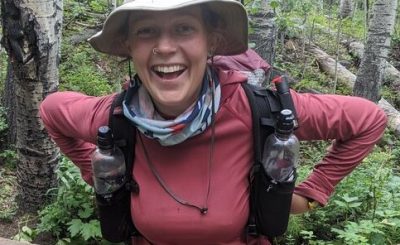Mikaela Osler ‘13 has shattered the fastest known time for a self-supported hike by a female on the 485-mile Colorado Trail.
Hiking with blistered feet and little sleep, Mikaela averaged 45 miles a day to complete the trek from Denver to Durango on Aug. 9. It took her 10 days, 12 hours and 36 minutes. Russian Olga King held the previous best time of 15 days, 2 hours, and 28 minutes set in 2018.
“I cried a lot and just was so happy it was over,” said Mikaela, a graduate student in creative writing at the University of New Mexico. “I think I was euphoric and so proud of myself.”
Buzz Burrell, co-founder of Fastest Known Time, a website that tracks hikers like Mikaela on 2,328 routes worldwide, called the 26-year-old’s performance a “great accomplishment.”
“Four days is a massive margin,” Burrell said. “As usual with these multi-day efforts, her trip report describes many hardships to endure, obstacles to overcome, a lot of determination, and then a last-gasp push to the finish.”
From Jericho, Vt., Mikaela is among an elite group to complete the Triple Crown — thru-hikes of the 2,650-mile Pacific Crest Trail, 3,100-mile Continental Divide Trail, and 2,190-mile Appalachian Trail.
Rated moderate to strenuous, the Colorado Trail has an elevation gain of more than 80,000 feet with most terrain above 10,000 feet; the highest point is 13,271 feet. The average hike-thru takes four to six weeks. The trail passes through six wilderness areas and goes over eight mountain ranges. Hypothermia, dehydration, and lightning hazards are common problems, and snowfields may be encountered well into mid-summer.
Self-supported hikers like Mikaela, who is known as FlyBy in the thru-hiking world, can accept support along the way, including caching supplies in advance, purchasing supplies along the way, to finding or begging for food or water. They cannot make plans for assistance from others.
“I was carrying my own stuff and had three mail drops with packages of food that I sent to businesses and campgrounds,” she said.
The base-weight for Mikaela’s backpack was 5½ pounds. She estimates she never carried more than 8 pounds of food.
Mikaela slept as little as 45 minutes one day and up to 6 hours on other days. Mikaela would sleep from 9 to 11 p.m. and then hike until 3 or 4 a.m., or when the sun came up.
“I didn’t plan it that way, but had a full moon, which was nice,” she said. “(This was) part of a psychological experiment. I think your brain needs sleep, but your body doesn’t need to be asleep. Just rest. A little sleep-break is supposed to reset the brain.”
For the last 75 miles on the Colorado Trail, Mikaela hiked 31 hours straight except for a 30-minute and a 15-minute nap.
“On the final day, I tried to run to keep myself awake,” Mikaela wrote. “I took a lot of caffeinated crystal lite and took a lot of caffeinated electrolyte pills, but they didn’t help that much. I felt bone-tired.”
Swaying on the trail with her eyes slipping out of focus and shutting, she ran as much as possible.
“I ran as much as I could, but with 6 or 7 miles to go my quads started to seize and I just had to walk really, really slowly. (I) finally finished a little after 8 p.m.,” said Mikaela, who acknowledged the Cheyenne, Ute and Pueblo tribes for allowing her to pass through their land.
Mikaela was a wilderness leader at UWC-USA and led wilderness trips while studying at Stanford, where she received her undergraduate degree in comparative studies in race and ethnicity.
She said UWC-USA prepared her for her hiking-related accomplishments.
“I think having modeling that type of balancing academics with things outside academics was formative for me,” she said. “Every time I led a trip with UWC-USA, I felt like I learned so much about myself as a leader and an outdoorswoman. Starting to lead trips was the beginning of that journey. So being a UWC wilderness leader was important.”
Mikaela was born into a hiking family. Her parents met while hiking the White Mountains in New Hampshire. When her father was in his early 20s, he hiked the Appalachian Trail. Growing up, Mikaela and her two siblings took hiking and backpacking trips with their parents.

